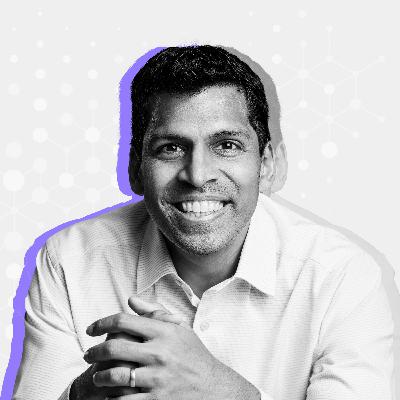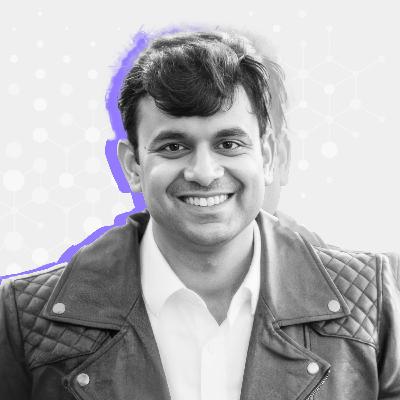Discover Me, Myself, and AI
Me, Myself, and AI

Me, Myself, and AI
Author: MIT Sloan Management Review
Subscribed: 103,951Played: 482,540Subscribe
Share
© 858384
Description
Discover what separates AI success from AI hype. In this series from MIT Sloan Management Review, AI winners share their secrets and success stories from the front lines. Explore the future of artificial intelligence with leaders from companies like YouTube, Cisco, and Hugging Face who are turning AI's potential into measurable business value.
109 Episodes
Reverse
On today’s episode, Wendy’s product manager Will Croushorn joins Sam to share how FreshAi, the fast-food restaurant’s voice-based AI ordering system, is reinventing the drive-through experience for millions of customers. From handling 200 billion ways to order a Dave’s Double burger to making fast food more accessible for guests in multiple languages, Will reveals how empathy and innovation will positively impact the future of convenience. Learn how his team turns speech data into insight, builds trust in automation, and can even hide a few Easter eggs in your next order. Read the episode transcript here. That's a wrap on Season 12!
We'll back in January with a bonus episode.
Guest bio:
Will Croushorn is a product leader at Wendy’s and cocreator of its drive-through voice agent, FreshAi, which handles more than 150,000 orders each day across hundreds of stores throughout the U.S. Recognized by Fast Company as one of the “Next Big Things in Tech,” the artificial intelligence platform shows that AI can deliver measurable impact at enterprise scale. Croushorn’s career has been shaped by relentless curiosity: He started a school in northern Iraq, became fluent in Behdini Kurdish, and now advances vision and multimodal AI serve customers in entirely new ways.
Me, Myself, and AI is a podcast produced by MIT Sloan Management Review and hosted by Sam Ransbotham. It is engineered by David Lishansky and produced by Allison Ryder.
We encourage you to rate and review our show. Your comments may be used in Me, Myself, and AI materials.
ME, MYSELF, AND AI® is a federally registered trademark of Massachusetts Institute of Technology. All rights reserved.
On this episode, OpenAI’s chief economist Ronnie Chatterji describes how artificial intelligence is reshaping both the economy and scientific innovation. Ronnie discusses the dual economic impacts of AI — the near-term boost from infrastructure investments like chips and data centers, and the longer-term productivity gains as AI tools integrate into enterprises and consumer life. Beyond consumer convenience, he notes, the key question for economists and corporate leaders alike is when — and how — AI will unlock sustained economic value inside organizations.
Tune in for Ronnie's perspective on how AI can help researchers test ideas faster, combine insights across disciplines, and make better choices about which problems to pursue. Read the episode transcript here.
Guest bio:
Aaron (Ronnie) Chatterji is OpenAI’s first chief economist. He is also the Mark Burgess & Lisa Benson-Burgess Distinguished Professor at Duke University. He served in the Biden administration to implement the CHIPS and Sciences Act and was acting deputy director of the National Economic Council. Before that, he was chief economist at the Department of Commerce and a senior economist at the White House Council of Economic Advisers. He also previously taught at Harvard Business School, worked at Goldman Sachs, and was a term member of the Council on Foreign Relations. Chatterji is on leave as a research associate at the National Bureau of Economic Research. He holds a Ph.D. from University of California, Berkeley and a B.A. in economics from Cornell University.
Me, Myself, and AI is a podcast produced by MIT Sloan Management Review and hosted by Sam Ransbotham. It is engineered by David Lishansky and produced by Allison Ryder.
We encourage you to rate and review our show. Your comments may be used in Me, Myself, and AI materials.
ME, MYSELF, AND AI® is a federally registered trademark of Massachusetts Institute of Technology. All rights reserved.
AI isn’t taking jobs — it’s changing what jobs are. On today’s episode, GeekWire’s Todd Bishop joins host Sam Ransbotham to dive into how artificial intelligence is reshaping work, learning, and creativity — not by replacing humans but by amplifying what we can do.
From classrooms where students use AI on exams to newsrooms rethinking how news stories get written, they explore the opportunities (and headaches) of this new era. It’s a smart, funny, and refreshingly real look at how we’re all learning to work with our newestcoworker — artificial intelligence. Read the episode transcript here.
Guest bio:
Todd Bishop is cofounder of GeekWire, the Seattle-based business and technology news site, where he covers topics like AI, Microsoft, and Amazon, in addition to hosting a weekly podcast.
A native of Orland, California, the longtime journalist previously worked at The Philadelphia Inquirer, Puget Sound Business Journal, and the Seattle
Post-Intelligencer.
Me, Myself, and AI is a podcast produced by MIT Sloan Management Review and hosted by Sam Ransbotham. It is engineered by David Lishansky and produced by Allison Ryder.
We encourage you to rate and review our show. Your comments may be used in Me, Myself, and AI materials.
ME, MYSELF, AND AI® is a federally registered trademark of Massachusetts Institute of Technology. All rights reserved.
Vishal Gupta, engineering manager, machine learning at Reddit, joins the podcast to explain how the social media community platform uses artificial intelligence to improve user experience and ad relevance. Much of the advertising work relies on increasingly sophisticated recommender systems that have evolved from simple collaborative filtering to deep learning and large language model–based systems capable of multimodal understanding.
Vishal and Sam also explore the philosophical and ethical aspects of
AI-driven platforms. Vishal emphasizes the importance of balance —
between exploration and exploitation in recommendations, between
advertiser goals and user experience, and between human- and
machine-generated content. He argues that despite the rise of
AI-generated material, authentic human conversation remains vital and
even more valuable as models depend on it for training. Read the episode transcript here.
Guest bio:
Vishal Gupta is a seasoned engineering leader who leads multiple
artificial intelligence and machine learning teams at Reddit in the ads
domain. He has a decade of experience working on cutting-edge machine
learning techniques at companies like DeepMind, Google, and Twitter.
Gupta is passionate about applied AI research that significantly
contributes to a company’s top and bottom lines.
Me, Myself, and AI is a podcast produced by MIT Sloan Management Review and hosted by Sam Ransbotham. It is engineered by David Lishansky and produced by Allison Ryder.
We encourage you to rate and review our show. Your comments may be used in Me, Myself, and AI materials.
Cisco is well known for its data, networking, security, and collaboration products. On today’s episode, Cisco’s president and chief product officer, Jeetu Patel, joins Sam for a discussion about artificial intelligence, a “megatrend” Jeetu sees as perhaps more significant than the development of the internet or the automobile because of its ability to build on past technological advances.
Jeetu and Sam discuss how to manage AI and how to staff for it — Jeetu argues that replacing less experienced or younger workers with technology deprives organizations of key perspectives and new ideas, and instead advocates for developing reverse-mentoring programs inside organizations. Read the episode transcript here.
Guest bio:
Jeetu Patel, Cisco’s president and chief product officer, combines product design and development expertise, operational rigor, and market understanding to create high-growth businesses. He is tasked with building world-class products to solve customers’ problems, and connect and protect every aspect of their organization in the AI era. Previously a general manager at Cisco, he led the strategy and development of its Security and Collaboration businesses.
Before Cisco, Patel was the chief product officer and chief strategy officer at cloud content management company Box. He’s also held roles at EMC, including chief executive of its Syncplicity business unit, CMO for the Information Intelligence Group, and chief strategy officer. He currently serves on the board of JLL, a commercial real estate services company. Jeetu has a bachelor’s degree in information decision sciences from the University of Illinois at Chicago, and lives in the San Francisco Bay Area.
Me, Myself, and AI is a podcast produced by MIT Sloan Management Review and hosted by Sam Ransbotham. It is engineered by David Lishansky and produced by Allison Ryder.
We encourage you to rate and review our show. Your comments may be used in Me, Myself, and AI materials.
A chemical engineer by training, Angela Nakalembe worked in the sciences and management consulting before landing at YouTube as the company’s engineering program manager for trust and safety.
At YouTube, Angela explains, AI has become a first line of defense against harmful content. The technology not only accelerates content moderation tasks but makes the process more humane, by filtering out problematic content before it reaches a human reviewer. To combat the proliferation of AI-generated content that may be hard to discern from assets created by humans, YouTube, its parent company Google, and others have joined the Coalition for Content Provenance and Authenticity Alliance to establish standards for the origin of content they observe. Also on today’s episode, Angela shares some personal experiences using large language models (LLMs) and Google’s own AI tools to illustrate how she sees individuals using AI in the future. Read the episode transcript here.
Guest bio
Angela Nakalembe is an operations leader, internet safety expert, and advocate for responsible AI development. As an engineering program manager at YouTube, she leads strategic initiatives focused on protecting billions of users through innovative safety features and risk mitigation strategies, work that has earned multiple Google product excellence awards. Nakalembe developed her strategic expertise as a management consultant, when she supported multimillion-dollar technology migrations for Fortune 50 companies. She currently provides mentoring through TechWomen, a U.S. Department of State initiative creating the next generation of women technology leaders worldwide, and she teaches yoga.
Me, Myself, and AI is a podcast produced by MIT Sloan Management Review and hosted by Sam Ransbotham. It is engineered by David Lishansky and produced by Allison Ryder.
We encourage you to rate and review our show. Your comments may be used in Me, Myself, and AI materials.
Thomas Wolf is the cofounder and chief science officer of open-source AI platform Hugging Face, which provides access to thousands of pretrained AI models that can be downloaded and run locally. With over 10 million users, getting started on the site can be a daunting task. Thomas explains how the company aims to improve its accessibility through documentation on the company blog as well as community feedback, similar to social media likes and upvoting.
Thomas and Sam discuss the benefits and trade-offs of both open-source and closed-source AI models, as well as the evolution of microchips and the future of hardware and software development — as well as the hopes Thomas has for the future of coding with AI, starting with his children’s generation. Read the episode transcript here.
Guest bio:
Thomas Wolf is cofounder and chief science officer of Hugging Face, a collaborative AI platform. Wolf likes creating open-source software (OSS) that makes complex research, models, and data sets widely accessible. He can also be found pushing for open science in research in AI and machine learning, to try lowering the gap between academia and industrial labs through projects like the BigScience Workshop. He also writes and produces education content on AI, machine language, and natural language processing, including the reference book Natural Language Processing with Transformers, The Ultra-Scale Playbook, his blog, and videos.
Me, Myself, and AI is a podcast produced by MIT Sloan Management Review and hosted by Sam Ransbotham. It is engineered by David Lishansky and produced by Allison Ryder.
We encourage you to rate and review our show. Your comments may be used in Me, Myself, and AI materials.
Today’s episode is a bonus drop from our friends over at the MIT CSAIL Alliances podcast. We'll be back on September 16 with new episodes of Me, Myself, and AI.
Chris Miller is professor of international history at Tufts University. He joins the MIT CSAIL Alliances podcast to share insights from his recent book, Chip War: The Fight for the World's Most Critical Technology.
Me, Myself, and AI is a collaborative podcast from MIT Sloan Management Review and Boston Consulting Group and is hosted by Sam Ransbotham and Shervin Khodabandeh. Our engineer is David Lishansky, and the executive producer is Allison Ryder.
Stay in touch with us by joining our LinkedIn group, AI for Leaders at mitsmr.com/AIforLeaders or by following Me, Myself, and AI on LinkedIn.
We encourage you to rate and review our show. Your comments may be used in Me, Myself, and AI materials.
Julian Adams tried but didn’t succeed at retirement after a productive career as a medical chemist with several U.S. Food and Drug Association approvals of cancer-related treatments, including cell therapy for bone marrow transplantation. Soon after, his participation in a Stand Up To
Cancer advisory group led to his appointment as the nonprofit’s president and CEO.
The research organization raises money to advance the diagnosis of numerous cancers. Given rapid technological advancements, our podcast hosts were eager to invite Julian on the show to share how Stand Up To Cancer uses artificial intelligence to aid in this pursuit. Read the episode transcript here.
For more information on Stand Up To Cancer and how to donate
to the organization, please visit this website.
Guest bio
Julian Adams, president and CEO of Stand Up To Cancer, is among the world’s foremost oncology researchers. He was previously CEO of biopharmaceutical company Gamida Cell and president of R&D at Infinity Pharmaceuticals, where he oversaw development of small molecule drugs to treat cancer. He has also held roles at Millennium Pharmaceuticals, Boehringer Ingelheim, LeukoSite, and ProScript.
Adams’s recognitions include the 2012 Warren Alpert Foundation Prize for his role in the discovery and development of bortezomib, an anti-cancer drug; the 2012 C. Chester Stock Award Lectureship from Memorial Sloan Kettering Cancer Center; and the 2001 Ribbon of Hope Award for Velcade from the International Myeloma Foundation. He holds more than 40 patents and has authored more than 130 papers and book chapters. He received his bachelor’s degree and an honorary doctor of science degree from McGill University and his Ph.D. from MIT in synthetic organic chemistry.
Me, Myself, and AI is a collaborative podcast from MIT Sloan Management Review and Boston Consulting Group and is hosted by Sam Ransbotham and Shervin Khodabandeh. Our engineer is David Lishansky, and the executive producer is Allison Ryder.
Stay in touch with us by joining our LinkedIn group, AI for Leaders at mitsmr.com/AIforLeaders or by following Me, Myself, and AI on LinkedIn.
We encourage you to rate and review our show. Your comments may be used in Me, Myself, and AI materials.
Josh Weiner, senior vice president of consumer engagement and analytics at CVS Health, is passionate about making health care more personalized, connected, preventative, and accessible. On today’s episode, Josh joins Sam and Shervin to explain how the integrated health care company is structured and how it is using AI to achieve those goals. Read the episode transcript here.
Me, Myself, and AI is a collaborative podcast from MIT Sloan Management Review and Boston Consulting Group and is hosted by Sam Ransbotham and Shervin Khodabandeh. Our engineer is David Lishansky, and the executive producer is Allison Ryder.
Guest bio
At CVS Health, where Josh Weiner is the senior vice president of consumer engagement and analytics, his priority is personalizing consumer experiences and developing the health care company’s app. Previously, he was a health care leader at Meta, where he supported product development, algorithm engineering, and acquisitions. He was also a senior analytics expert at McKinsey and Co. Weiner is a board member at nonprofits Enduring Hearts and Docs for Tots. He holds a bachelor’s degree from Carnegie Mellon University and a master’s from Northwestern University.
Stay in touch with us by joining our LinkedIn group, AI for Leaders at mitsmr.com/AIforLeaders or by following Me, Myself, and AI on LinkedIn.
We encourage you to rate and review our show. Your comments may be used in Me, Myself, and AI materials.
The suggestions and support offered by AI are helpful only if they’re relevant. On today’s episode, Walter Sun, senior vice president and global head of artificial intelligence at SAP, joins Sam and Shervin to share how his organization is helping employees get smarter about artificial intelligence through the company’s AI Days. Additionally, Walter gives specific examples of support that AI agents could provide to an end user, and makes the case that small language models (fine-tuned large language models) can be built to assist in decision-making.
Read the episode transcript here.
Guest bio:
Walter Sun is senior vice president and global head of artificial intelligence at SAP, where his team applies AI across applications for improved automation, natural human-machine interaction, and augmentation of decisions.
Sun joined SAP in 2023 from Microsoft, where he was vice president of Copilot Applied Artificial Intelligence. While there he founded Bing Predicts, which leveraged anonymized and aggregated data for predictive analytics. He also delivered many AI features for the Bing search engine, Microsoft Windows, Microsoft Dynamics 365, and Microsoft Power Platform. Previously, Sun worked at BlackRock Financial Management and at Apple as a senior software engineer.
Sun has taught at Seattle University and the University of Washington, and he is currently an advisory board member at Georgia Tech and the University of Rochester, and an MIT Tech Review Global Insights panelist. He obtained his bachelor’s from Georgia Tech and his Ph.D. and master’s from MIT.
Me, Myself, and AI is a collaborative podcast from MIT Sloan Management Review and Boston Consulting Group and is hosted by Sam Ransbotham and Shervin Khodabandeh. Our engineer is David Lishansky, and the executive producer is Allison Ryder.
Stay in touch with us by joining our LinkedIn group, AI for Leaders at mitsmr.com/AIforLeaders or by following Me, Myself, and AI on LinkedIn.
We encourage you to rate and review our show. Your comments may be used in Me, Myself, and AI materials.
Many of us know Goodwill Industries International as a retailer that accepts and resells donated goods. What the average consumer may not know is that the nonprofit takes in over 5 billion pounds of goods each year — and not all of it can be resold. For those unwanted or unviable items, the organization can either look into recycling or upcycling, and with the help of AI, it’s able to efficiently make that determination while also improving its process for sorting and allocating sellable goods for different retail channels.
Additionally, Goodwill helps its workforce with career-development skills. Much of this training has been enhanced with AI. Tune in to this episode to hear directly from Goodwill CEO Steve Preston about how the organization is using technology to fulfill a mission that extends beyond the retail store. Read the episode transcript here.
Guest bio:
As president and CEO of Goodwill Industries International, Steven C. Preston leads a network of 153 local Goodwill organizations with a combined revenue of $8.2 billion. In addition to being a secondhand retail leader, Goodwill is a leading nonprofit provider of workforce training and development in North America.
Positioning the organization at the forefront of workforce development has been a top focus for Preston since he joined Goodwill in 2019. He has also forged partnerships with organizations focused on sustainable practices in the secondhand retail marketplace and developed mission-focused marketing efforts to elevate the Goodwill brand.
Previously, Preston served in numerous operational and financial leadership positions in both the public and private sectors. After heading the U.S. Department of Housing and Urban Development and the Small Business Administration, he led successful turnarounds as the CEO of Oakleaf Global Holdings and Livingston International. He also served as the CFO of Waste Management and ServiceMaster.
Me, Myself, and AI is a collaborative podcast from MIT Sloan Management Review and Boston Consulting Group and is hosted by Sam Ransbotham and Shervin Khodabandeh. Our engineer is David Lishansky, and the executive producer is Allison Ryder.
Stay in touch with us by joining our LinkedIn group, AI for Leaders at mitsmr.com/AIforLeaders or by following Me, Myself, and AI on LinkedIn.
We encourage you to rate and review our show. Your comments may be used in Me, Myself, and AI materials.
In today’s episode, Chandra Kapireddy, head of generative AI, machine learning, and analytics at Truist, delves into the evolving landscape of AI with a particular focus on how GenAI tools reshape the way Truist and similar organizations must navigate model risk management and regulations. GenAI is more versatile than traditional AI, he notes, yet its flexibility introduces new challenges around ensuring model reliability, validating outputs, and making sure that AI-driven decisions don’t lead to unfair or opaque outcomes.
Chandra’s responsible AI approach at Truist is focused on risk mitigation while emphasizing the importance of human oversight in high-stakes decision-making. He points out that while GenAI can vastly improve productivity by handling repetitive or analysis-heavy tasks, it’s essential to properly train employees in order to use the tools effectively and not over-rely on their outputs, especially given their tendency to hallucinate or produce inaccurate results. Read the episode transcript here.
Guest bio
Chandra Kapireddy is head of generative AI, machine learning, and analytics, at Truist. He brings over 27 years of experience building and leading world-class data, analytics, and artificial intelligence teams to the financial services firm. Kapireddy has held key leadership positions at some of the industry’s leading companies, including Capital One, Wells Fargo, Bank of America, Oracle, and Amazon Web Services. Most recently, he served as managing director and head of AI/ML products for JPMorgan Chase, where he served on the firm’s AI Executive Council, which influences its strategy, products, controls, and governance.
Me, Myself, and AI is a collaborative podcast from MIT Sloan Management Review and Boston Consulting Group and is hosted by Sam Ransbotham and Shervin Khodabandeh. Our engineer is David Lishansky, and the executive producer is Allison Ryder.
Stay in touch with us by joining our LinkedIn group, AI for Leaders at mitsmr.com/AIforLeaders or by following Me, Myself, and AI on LinkedIn.
We encourage you to rate and review our show. Your comments may be used in Me, Myself, and AI materials.
Harvard Business School professor Raffaella Sadun’s research has historically focused on digital reskilling. Now, rapid technological changes — like AI — are reshaping the nature of work. Raffaella’s research has explored how AI might empower those with intermediate expertise, such as store managers and blue-collar workers, to become more efficient and satisfied in their roles. She shares a bit about her research on today’s episode of Me, Myself, and AI and highlights the potential for AI to improve teamwork and innovation by bridging the gaps between different functional teams. Her experiments show that AI can enhance productivity and output quality, sometimes even substituting for team collaboration, while also improving speed and efficiency in problem-solving tasks. Read the episode transcript here.
Guest bio:
Raffaella Sadun is the Charles E. Wilson Professor of Business Administration at Harvard Business School, where she cochairs the Project on Managing the Future of Work and is coprincipal investigator of the Digital Reskilling Lab. Her research focuses on managerial and organizational drivers of productivity and growth in corporations and the public sector. She cofounded several large-scale projects to measure management practices and managerial behavior in organizations, such as the World Management Survey, the Executive Time Use Study, and U.S. Census Bureau’s Management and Organizational Practices Survey of hospitals.
Me, Myself, and AI is a collaborative podcast from MIT Sloan Management Review and Boston Consulting Group and is hosted by Sam Ransbotham and Shervin Khodabandeh. Our engineer is David Lishansky, and the coordinating producers are Allison Ryder and Alanna Hooper.
Stay in touch with us by joining our LinkedIn group, AI for Leaders at mitsmr.com/AIforLeaders or by following Me, Myself, and AI on LinkedIn.
We encourage you to rate and review our show. Your comments may be used in Me, Myself, and AI materials.
Linda Yao, chief operating officer and head of strategy for Lenovo’s Strategy,
Solutions, and Services Group and vice president of hybrid cloud and AI
solutions, joins us to explain the organization’s transition from technology product company to managed services provider. It’s now helping organizations with the change management required to implement AI in the enterprise.
She shares both a framework around speed, ease, and expertise to facilitate this adoption, as well as the four pillars of AI readiness that Lenovo guides its clients to achieve. Tune in to this episode, also, for Linda’s perspective on the role of human connection in what she calls the era of inference, a time when we should focus on the implementation of maturing AI tools. Read the episode transcript here.
Guest Bio:
Linda Yao serves as vice president of hybrid cloud and AI solutions at Lenovo.
Yao recently also took on the role of chief operating officer and head of Lenovo’s Strategy, Solutions, and Services Group and established the company’s AI Center of Excellence.
Previously, at Boeing, she incubated a data science practice in the U.S. and India, built an
M&A team, and oversaw investments for one of the largest corporate retirement plans in the world. She earned her finance chops at IBM in New York and Shanghai. Yao earned her bachelor’s and master’s degrees from Harvard University and an engineering certificate from MIT. She is an active liaison for the U.S. Presidential Scholars Foundation and the
YoungArts, a national foundation.
Me, Myself, and AI is a collaborative podcast from MIT Sloan Management Review and Boston Consulting Group and is hosted by Sam Ransbotham and Shervin Khodabandeh. Our engineer is David Lishansky, and the executive producer is Allison Ryder.
Stay in touch with us by joining our LinkedIn group, AI for Leaders at mitsmr.com/AIforLeaders or by following Me, Myself, and AI on LinkedIn.
We encourage you to rate and review our show. Your comments may be used in Me, Myself, and AI materials.
Barbara Wixom, principal research scientist at MIT’s Center for Information Systems Research (CISR), draws on 30 years of research in this bonus episode of the Me, Myself, and AI podcast. She believes data monetization is the key to enterprise success with AI and breaks down why.
With hosts Sam Ransbotham and Shervin Khodabandeh, Barb details case examples to highlight best practices for AI implementation and how to measure value, as well as how data governance and ethics play a critical role in successful AI projects. They also talk about what companies get wrong and the challenges and rewards of AI research. Read the episode transcript here.
Guest bio:
Barbara Wixom is a principal research scientist at the MIT Center for Information Systems Research (CISR). Her academic research explores how organizations generate business value from data assets. She is the author of the award-winning book, Data Is Everybody’s Business: The Fundamentals of Data Monetization, which she wrote to inspire workers to engage in data monetization.
Me, Myself, and AI is a collaborative podcast from MIT Sloan Management Review and Boston Consulting Group and is hosted by Sam Ransbotham and Shervin Khodabandeh. Our engineer is David Lishansky, and the coordinating producers are Allison Ryder and Alanna Hooper.
Stay in touch with us by joining our LinkedIn group, AI for Leaders at mitsmr.com/AIforLeaders or by following Me, Myself, and AI on LinkedIn.
We encourage you to rate and review our show. Your comments may be used in Me, Myself, and AI materials.
Jeff Miller moved from a career in government to focus on the health and safety of NFL players. Due to the nature of their sport, they are more prone to injuries, including concussions, than other professional athletes. By leveraging the game’s unique elements, such as the volume of cameras filming on-field activities, the NFL can gather large data sets to track injuries, and then segment their likelihood of occurrence by position and design equipment and update game rules to minimize them.
Jeff joins us to describe how the NFL has partnered with tech companies, including Amazon Web Services (AWS), to expand its technology fluency and implement these solutions. Listen to today’s episode to learn about specific equipment the NFL has produced and rule changes it has implemented to better track and protect its players, as well as one element of the game Jeff believes technology cannot replace. Read the episode transcript here.
Guest bio
Jeff Miller is the National Football League’s executive vice president overseeing player health and safety. He is also the NFL’s executive vice president of communications, public affairs, and policy. During his tenure, the league has used data, artificial intelligence, and engineering to improve protective equipment, make rule changes, and support independent medical research related to players’ wellness and the rate of concussions.
Before joining the league, Miller spent a decade on Capitol Hill as chief counsel and staff director for the Antitrust and Business Competition Subcommittee of the U.S. Senate Judiciary Committee. He earned his Juris Doctor from the University of Chicago Law School and his bachelor’s degree from the University of Pennsylvania.
Me, Myself, and AI is a collaborative podcast from MIT Sloan Management Review and Boston Consulting Group and is hosted by Sam Ransbotham and Shervin Khodabandeh. Our engineer is David Lishansky, and the coordinating producers are Allison Ryder and Alanna Hooper.
Stay in touch with us by joining our LinkedIn group, AI for Leaders at mitsmr.com/AIforLeaders or by following Me, Myself, and AI on LinkedIn.
We encourage you to rate and review our show. Your comments may be used in Me, Myself, and AI materials.
After trying his luck at the stock market, Ronald den Elzen, pursued a career in technology leadership instead. Today, as the chief technology and digital officer of The Heineken Company, he encourages his team to think about the legacy beverage company as a 160-year-old startup with global scale, operating with multiple brands in more than 80 markets. When members of his team can work with agility and less fear of making mistakes, he finds they are more successful at rolling out new technology initiatives.
Heineken uses AI extensively in areas including revenue management, promotional optimization, and logistics, but Ronald believes much value still comes from traditional AI — such as predictive analytics and machine learning models — rather than chasing the latest trends like generative AI (GenAI). Heineken is focused on using these foundational tools to drive tangible. Read the episode transcript here.
Guest bio:
Ronald den Elzen, chief digital and technology officer at The Heineken Company, has been with the international brewer since 1996. He previously held roles in data and transformation and served as the CEO of Heineken USA. Den Elzen lives in the Netherlands.
Me, Myself, and AI is a collaborative podcast from MIT Sloan Management Review and Boston Consulting Group and is hosted by Sam Ransbotham and Shervin Khodabandeh. Our engineer is David Lishansky, and the coordinating producers are Allison Ryder and Alanna Hooper.
Stay in touch with us by joining our LinkedIn group, AI for Leaders at mitsmr.com/AIforLeaders or by following Me, Myself, and AI on LinkedIn.
We encourage you to rate and review our show. Your comments may be used in Me, Myself, and AI materials.
Over the past year, we’ve seen generative AI explode. In this episode, we review insights shared with us from five prior guests — from Microsoft, GitHub, Meta, Partnership on AI, and NASA — and consider what’s changed, what’s the same, and what new concerns organizations face. With GenAI tools becoming ubiquitous and democratized, organizations grapple with how to use them at the enterprise level and how to regulate their use for employees. They’re also struggling with openness and transparency in the name of knowledge sharing while protecting competitive advantage.
The balance between openness, competition, and responsible deployment of AI is crucial as AI tools continue to evolve. Read the episode transcript here.
For more, listen to these prior episodes in full:
Out of the Lab and Into a Product: Microsoft’s Eric Boyd
If 10% of the World Were Developers: GitHub’s Mario Rodriguez
Sharing AI Mistakes: Partnership on AI’s Rebecca Finlay
Building Connections Through Open Research: Meta’s Joelle Pineau
AI on Mars: NASA’s Vandi Verma
Me, Myself, and AI is a collaborative podcast from MIT Sloan Management Review and Boston Consulting Group and is hosted by Sam Ransbotham and Shervin Khodabandeh. Our engineer is David Lishansky, and the coordinating producers are Allison Ryder and Alanna Hooper.
Stay in touch with us by joining our LinkedIn group, AI for Leaders at mitsmr.com/AIforLeaders or by following Me, Myself, and AI on LinkedIn.
We encourage you to rate and review our show. Your comments may be used in Me, Myself, and AI materials.
Mary Davis, CEO of Special Olympics, wants the people she represents to “have a seat at the table” as AI evolves. In this episode of the Me, Myself, and AI podcast, Davis talks about her organization’s mission along with the growing role of AI and how it’s crucial to ensure that people with intellectual disabilities — a group often overlooked in tech discussions — are included in AI development.
Special Olympics helps people with intellectual disabilities through sports, education, and leadership programs. Its Unified Champion Schools program is an inclusive education initiative that benefits all students, both those with and without intellectual disabilities, reduces bullying, and improves academic performance.
Mary also shares the results of a study conducted by the Special Olympics and Harvard University citing strong support from parents, teachers, and the athletes themselves to use AI to support people with intellectual disabilities, especially in educational contexts. She sees AI as a powerful tool for “leveling the playing field” and describes specific applications that the Special Olympics is using for employees and athletes. Read the episode transcript here.
Guest bio:
Mary Davis has been the CEO of Special Olympics since 2016. She joined the nonprofit organization soon after college as a volunteer and coach in her native Ireland. She progressed through various leadership roles before becoming its global CEO: She was CEO of the Special Olympics World Summer Games Dublin 2003, the first such event held outside the United States; CEO of Special Olympics Ireland; and president and managing director of Special Olympics Europe/Eurasia. Davis was awarded a Person of the Year Award for her work on the 2003 World Summer Games and her years of service with Special Olympics Ireland.
Me, Myself, and AI is a collaborative podcast from MIT Sloan Management Review and Boston Consulting Group and is hosted by Sam Ransbotham and Shervin Khodabandeh. Our engineer is David Lishansky, and the coordinating producers are Allison Ryder and Alanna Hooper.
Stay in touch with us by joining our LinkedIn group, AI for Leaders at mitsmr.com/AIforLeaders or by following Me, Myself, and AI on LinkedIn.
We encourage you to rate and review our show. Your comments may be used in Me, Myself, and AI materials.

























Loving this podcast—real enterprise AI wins, zero fluff! For anyone actually deploying these ideas, https://aitoolranker.com/ has become my go-to: latest 2025 rankings with real benchmarks (speed, cost per 1k tokens, output quality scores). Saved me weeks picking the right models after each episode. Clean, technical, no sponsorship bias. Must-bookmark if you're building AI in business!
Great podcast episode! For anyone turning AI hype into real business value, I highly recommend pairing this with the super-detailed, technical tool breakdowns on https://aireviewhq.com/ — their recent pieces on Abacus AI, JobHire.ai, and Luma AI alternatives gave me exactly the practical insights I needed to move from theory to deployment faster. Keep up the excellent work, MIT!
Thank you for sharing; I feel I've gained a lot! AI tools are being used more and more in my life, so figuring out how to reduce the AI content rate in writing is a problem I often need to deal with at this stage. Recently, I discovered a tool called ZeroGPT Plus, which can detect and rewrite AI-generated content, and it has been a great help to me.
The show is amazing! I started listening to it two weeks ago, and it has been a great help in understanding the usage of AI in different industries and systems. It could be even better if the moderator asked the guests at the end of each section for their recommendations—especially for young people or, in my case, engineers—on the best way to use AI in their careers.🙏🏻🙏🏻
If you're looking to improve your understanding of technology and AI, including cybersecurity, consider exploring courses that offer valuable insights and practical knowledge: https://technisaur.com.au/cyber-security-course/.
Loved the conversation and the Q&A. I am also a Cornell Bird ID fan!
Recently, a technological breakthrough has been obvious, for example, AI. The company https://www.decktopus.com/ skillfully uses this to help other people create portfolios and presentations
🔴WATCH>>ᗪOᗯᑎᒪOᗩᗪ>>👉https://co.fastmovies.org
I would love to look at that data. humans are so weird sometimes